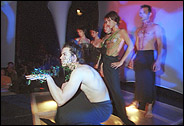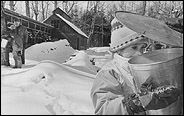On Campus
Of Course
Is it all in your head?
 |
|
Does prayer really help someone get over an illness? What about the importance of social support? How does yoga or meditation affect the healing process?
These are some of the questions that come up in Mind-Body Medicine, a first-year seminar led by medicine professor Patricia Dobkin.
It's been a popular course since it was first offered five years ago, something Dobkin, a psychologist in the rheumatology department at the Montreal General Hospital, attributes to the title itself. "I didn't give it that name for nothing," she says. "It's a fun course but it's not for the faint of heart or for procrastinators."
In fact, given the work involved, Dobkin warns students on their first day that they should begin work almost immediately on their end of term assignment, the Health Behaviour Change Project.
Each of the 24 students, who are mostly female and mostly from the Faculty of Arts, chooses a health problem she wants to improve. The need for an early start stems from the fact that change takes time, explains Dobkin. One student, for instance, is observing what happens to her energy level with increased exercise. Over the years, projects have included attempts to relieve insomnia, poor concentration and cigarette addiction.
In today's lecture on science and religion, she asks the class to write down, anonymously, their philosophy of life or religion and how it affects their health. Later, students read out the submissions of fellow students. One writes of trying to maintain a balance in life, while another tries to live in the present to reduce stress.
Does believing in a religion or a philosophy affect one's health? Well, according to Dobkin, until the scientific revolution, there was no perceived division between mind, spirit and body.
Contemporary empirical studies on the subject aren't conclusive, says Dobkin. Nevertheless, in her years of working with patients in chronic pain, she's certain that faith must be taken into consideration in the treatment of a patient. She shakes her head recounting to the class how never once in her graduate training was the question of religion raised. "It's still not part of professional training!
"Today, we have to open our minds; there are no set answers," she tells the class, citing a passage on prayer in Kitchen Table Wisdom, a book written by a physician who has suffered from a chronic illness most of her life. "Prayer isn't a way to get what you want... When we pray, we stop trying to control life but remember that we belong to life."
Passion for Phassion
 PHOTO: Owen Egan
PHOTO: Owen Egan |
|
A few sashays down the runway, a little model attitude and faster than you can say "Kate Moss," Phassion, the 10th annual McGill AIDS Benefit Show, has raised over $11,000 for a local children's charity.
Organized by management undergrads, Phassion was held at the Just For Laughs Museum last Friday where 800 people paid $20 to $25 to see a combination of fashion and art show.
The money, which surpassed the $10,000 target, will be donated to the Fondation Pour l'Amour de Sarah; a non-profit organization in Ville St. Laurent that cares for 39 orphaned children infected with HIV.
Competition is fierce to be a Phassion model; last fall, 200 McGill students auditioned for 39 spots.
While a few of the international ready-to-wear labels, such as Diesel and Blue Marine & Co, made it to the runway, most of the clothes spotlighted at the show were created by Quebec couturiers, including Muse, Dubuc and Dénommé Vincent. Garments deigned by students of the Institut Supérieur de Design de Mode also made the cut.
"Our goal was to give Quebec talent or emerging artists a chance to shine," explains management student Trish Reid, Phassion's co-director alongside Pascale Sejean.
A total of 15 management students spent the past year organizing the Phassion soirée. The logistics of the multifaceted event ranged from lining up sponsors to hiring scratch DJs. In putting on Phassion, Reid says, "our number one goal was to provide students with an opportunity to touch a little bit of everything and practice their management skills."
Anyone wanting to know more about Phassion or the Fondation Pour l'Amour de Sarah can consult www.phassion.com or send inquiries to info@phassion.com.
The day of the Locus
 |
|
Remember this number: 398-8411. It could save you if you're stuck trying to reach someone at McGill but have no phonebook handy. After dialling the number, the recorded voice of Louis Richer, associate director of voice technologies at Network and Communications Services, answers:
"Speak the full name of the person you are trying to reach," he says in that pleasant, familiar tone -- Richer's is the voice you hear when the University sends out mass phone messages to staff about urgent items.
"Nancy Lavigne," I say, thinking I'll say hi to Nancy out at Macdonald Campus Farm.
"Nancy Stephen?" a nasal male computer voice asks, wondering if I want to talk to Nancy in Printing Services.
"No," I say.
"Nancy Lavin?" continues the monotone.
"Yes," I respond, thinking this is a good deal closer to the pronunciation of Lavigne's name.
And the calls rings through, leading me to the right answering machine.
Mispronouncing names is a hazard of Locus Liaison's text-to-speech conversion of the 4,000 names in the McGill phonebook, but it's one easily rectified if staff members record their own name, says Richer.
In fact, Richer advises everyone to record his or her name. When two people have the same name, he suggests they mention their department. Jacek Slaboszewicz, a manager of security at NCS, found a solution to his name by simply recording "Yasec," the name by which everyone knows him.
Richer says that the NCS put the vocal telephone directory into place after having had success with the system in the residences. "It in no way cuts jobs," he reassures. "This is an application we have developed to improve service." It's also a free call if calling from a pay phone on campus, he adds.
Noting that the next move will be to include departments and services, Richer wagers that "one day, we won't need to print 8,000 copies of that &@!&!!! phonebook."
To record your name in the system, consult the NCS web site at www.mcgill.ca/ncs/voice/locus.
The sap's running!
 PHOTO: Cliff Skarstedt
PHOTO: Cliff Skarstedt |
|
While some of us accept the dictum of the lunar calendar that spring began on Tuesday, those of us who follow the wisdom of trees know that it really began a week ago last Saturday -- at least in this neck of the woods.
Yes, the sap is running at the Morgan Arboretum. It started, then stopped when the temperature dropped last week, and now it's running free flow and there's enough sap to fill the evaporator. So, pray for the temperature to hover around the two to four degree mark in the day and two below at night, for as long as possible.
At those temperatures, the ground water defrosts and the thirsty tree drinks up. At the same time, its enzymes -- chemicals in the sap that cause the starch to turn to sugar -- function at their prime, explains the Arboretum's education coordinator Mathieu Boudrias, who leads the tours of the maple grove.
Aside from the maples -- some of which near 300 years of age with a girth that sports up to four buckets -- visitors will see plenty of birds, including cardinals, cedar waxwings and woodpeckers, says Boudrias. They learn about the nature and history of maple-product making, from native people to the modern collector tubes and evaporators.
Even if the temperatures rise too quickly past the dreaded seven degrees when the enzymes quit and the sap stops, the Arboretum will offer its tours of the maple grove and a sugaring off meal until April 1.
Vegetarians may rejoice; the midday meal isn't quite typical of most Quebec sugar shacks. Alongside the baked beans and maple syrup pie is a choice between a meat or millet pie. Those not opting for the meal still qualify for tire d'érable (maple taffy on snow) and German sausages cooked outside.
To reserve for the meal and tour on March 31 or April 1, phone 398-7811. This weekend, the meal ($15 for adults, $7 for children/$12 and $6 if Arboretum members) is on a first-come, first-served basis. Food is served from 11 am to 4 pm and the tours are at 2 pm. All begin at the Arboretum's Conservation Centre.
Cows off limits
 |
|
The farm at Macdonald Campus usually welcomes visitors -- it's a popular site for school field trips. But for now, farm staffers would rather you stay away.
Only authorized personnel -- those with ongoing research and teaching activities on the farm -- will be allowed to enter its facilities until further notice. It's a temporary measure to reduce the risk of possible foot-and-mouth-disease infections of the animals by individuals who may have recently visited the British Isles and/or continental Europe.
If there is a pressingly important reason for you to visit the farm, you should first clear it with Gary O'Connell (farm director, 8600) or Etienne Tremblay (dairy herdsman, 7989) so that necessary precautions can be taken.

